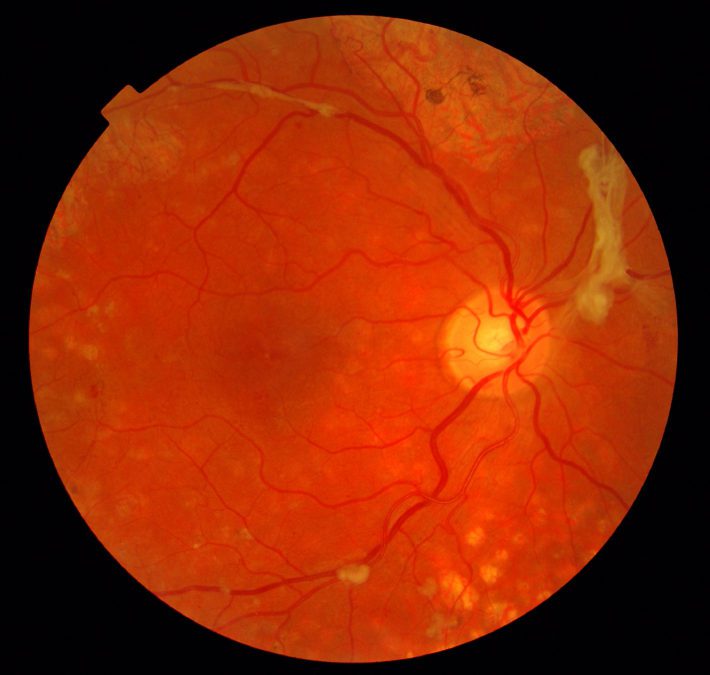What is Diabetes ?
Diabetes is a lifelong condition that causes the blood sugar levels in our body to become too high. Sugar levels in our body are controlled by a chemical called insulin, which is made by an organ called the pancreas. In some people, the pancreas does not work properly and this causes the sugar levels to rise. The raised sugar levels can affect the body in many ways and may cause damage to our eyes.
The two most common types of diabetes are: Type 1 and Type 2.
Type I
In type I diabetes; the immune system attacks the pancreas and causes damage. This means the body does not produce insulin and cannot control the sugar levels properly.
Type II
In type II diabetes the pancreas can still make insulin but usually it does not make enough or the insulin it makes does not work properly.
How does this affect my eyes?
Diabetes can affect the eyes in many ways. Most commonly, it causes damage to the retina, which is the inner layer of our eye and important for vision. Over time, the high sugar levels caused by diabetes can damage the blood vessels in the retina by causing them to become blocked and leak. This affects the blood supply to the retina and can cause problems with vision. This condition is called diabetic retinopathy.
As these blood vessels become blocked and leak, the retina does not receive the oxygen it needs to function properly. This causes damage to the blood vessels and in response; new blood vessels may start to grow. These new blood vessels do not function normally and can lead to further damage in the eye.
There are different stages of diabetic retinopathy depending on severity.
- Background diabetic retinopathy: the blood vessels start to become weaker but usually vision is not affected. This may also be called R1.
- Pre-proliferative diabetic retinopathy: there are more extensive changes to the blood vessels including areas of leakage. This is more serious and requires closer monitoring. This may also be called R2.
- Proliferative diabetic retinopathy: damage to the retina causes new blood vessels to grow, but these are weak and bleed very easily. This can result in vision loss and requires urgent treatment. This may also be called R3.
Another complication of diabetes in the eyes is called diabetic maculopathy. This is when damage occurs in the part of the retina responsible for our central vision (macula). This may also be called M1.
How does this affect my vision?
You may not notice any symptoms for your diabetic retinopathy and/or maculopathy. This is why it is very important to attend your eye screening appointments.
In some cases, you may notice:
- Blurry vision
- Patches missing in your vision
- Distortion in vision
- Sudden or gradual vision loss
Is there any treatment?
There are two main treatment options that can help preserve and stabilize vision in diabetes: laser and intravitreal injections. These treatments are generally used in patients with proliferative retinopathy (R3) or diabetic maculopathy (M1).
Laser
Laser can be used to treat the new blood vessels at the back of the eye in proliferative diabetic retinopathy. This can help stabilise your vision and stop it from getting worse, but it does not improve your sight. The laser treatment is performed in the outpatient department with local anaesthetic drops, after dilating your pupils.
Laser treatment can also be used in some cases of diabetic maculopathy. This is a different type of laser but is performed in a similar way.
Intravitreal injections
Injections can be given into the eye to slow down the effect of diabetes and preserve your vision. This involves injecting a small amount of drug into the jelly of the eye (vitreous), which prevents fluid accumulation in the macula and also stops the growth of the new blood vessles in the retina.
The main medicines used are called anti-vascular endothelial growth factor (anti-VEGF) as they target a protein called vascular endothelial growth factor (VEGF). Aflibercept (Eylea), bevacizumab (Avastin) and ranibizumab (Lucentis) are the three main types of anti-VEGF available. Injections of steroid medication may also be used in some cases.
These injections are performed in the outpatient department with local anaesthetic drops. Your doctor can discuss the options with you in greater detail to help you decide which is most suitable for you.
Surgery
Surgery can also be considered in advanced cases to remove blood or scar tissue from inside the eye.
Is there anything I can do?
You can prevent diabetes from damaging your eyes or slow down any damage that has already occurred by keeping your diabetes under control.
Here are a few important steps that you can take to reduce the risk of diabetes affecting your eyes:
- Maintain a healthy, balanced diet with regular exercise
- Stop smoking
- Do not exceed recommended alcohol intake
- Ensuring your blood sugar, cholesterol and blood pressure are well controlled
- Attend your NHS eye screening appointments
Help
If you would like more information about your vision, and your treatment options, do get in touch here.
References
- uk. (2017). Diabetic retinopathy. [online] Available at: https://www.nhs.uk/conditions/diabetic-retinopathy/#:~:text=Diabetic%20retinopathy%20is%20a%20complication.
- CDC (2020). What is Diabetes?[online] Centers for Disease Control and Prevention. Available at: https://www.cdc.gov/diabetes/basics/diabetes.html.
- Diabetes UK. (n.d.). Types of diabetes. [online] Available at: https://www.diabetes.org.uk/diabetes-the-basics/types-of-diabetes.
- Inkling (n.d.). [online] Elsevier eBooks for Practicing Clinicians. Available at: https://expertconsult.inkling.com/read/bowling-kanski-clinical-ophthalmology-8e/chapter-13/diabetic-retinopathy#1142c23b04134a568739270a17e564c5
- org. (n.d.). Treatments. [online] Available at: https://stanfordhealthcare.org/medical-conditions/eyes-and-vision/diabetic-retinopathy/treatments.html.
